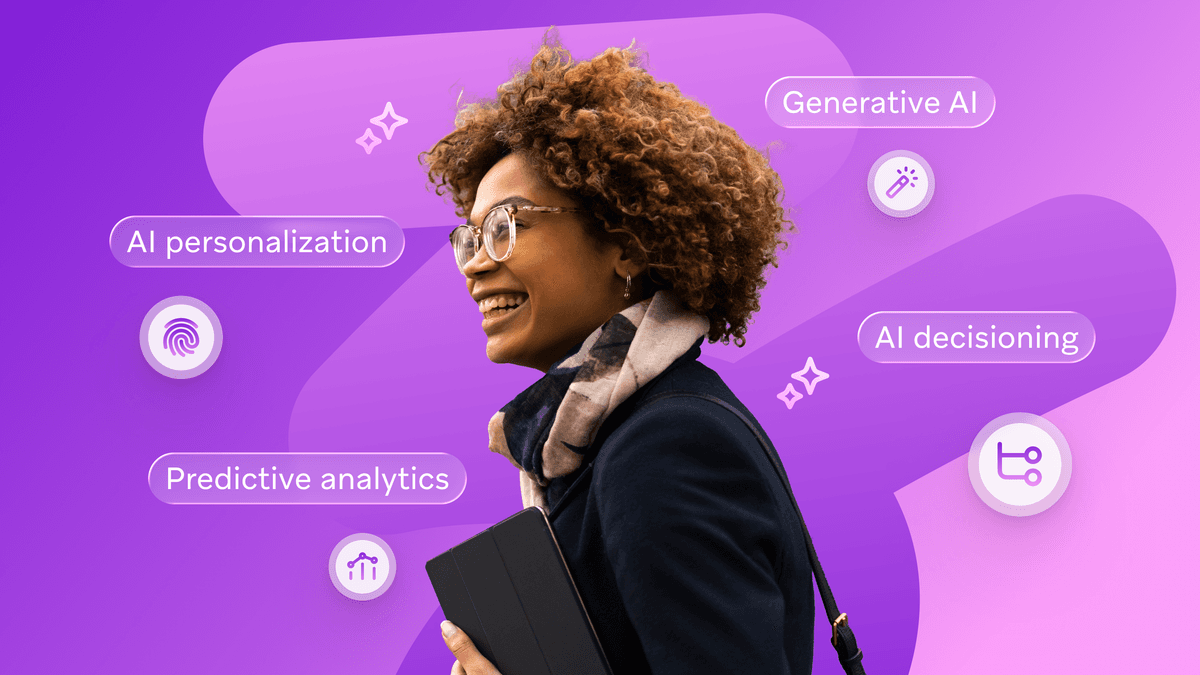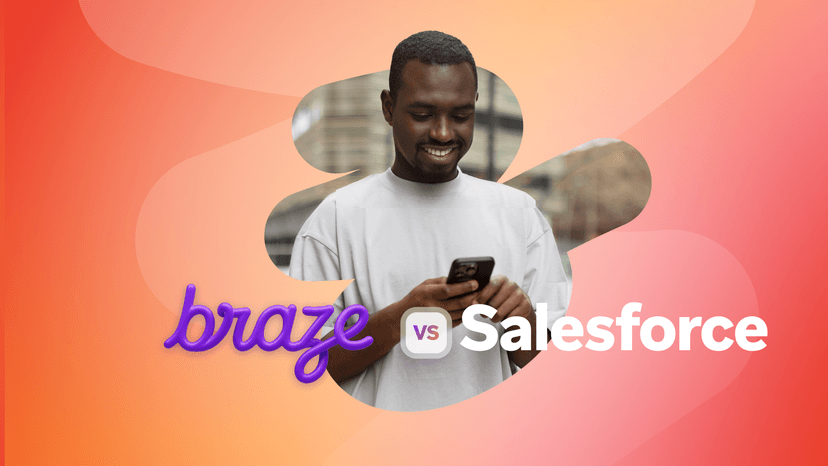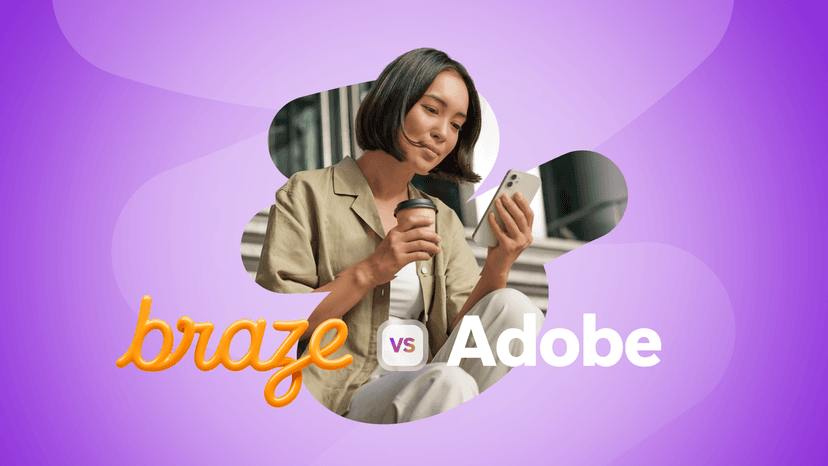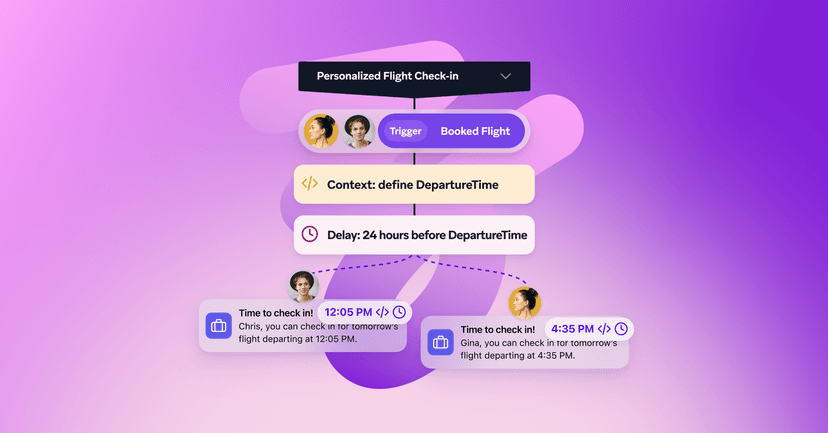The future is now: A CMO’s guide to embracing AI with confidence
Published on November 07, 2025/Last edited on November 07, 2025/7 min read


Team Braze
It’s safe to say that AI has evolved far beyond its initial industry hype and is now a cornerstone for high-performing brands. No longer just a pilot project, AI is a transformative tool that delivers tangible business outcomes, making it indispensable in the modern CMO’s arsenal.
AI empowers CMOs to turn art into science by enhancing creativity while driving revenue, efficiency, and measurable impact. Additionally, with AI decisioning, CMOs can optimize any business metric, deploy optimal offers, incentives, and campaigns that maximize profit, revenue, costs, and customer lifetime value (CLV).
However, as AI integrates into daily life, CMOs face a critical inflection point. The choices being made today will determine whether they lead or lag in the AI-powered marketing landscape. Success now means moving beyond experimentation to intentional action that prioritizes the right initiatives, builds capable teams, and validates AI investments.
Wherever you are in the AI adoption curve, read on to discover the five AI tools every CMO needs to know about, and five actionable steps to help build your base, then keep pace.
High adoption and optimism among CMOs
Nearly 93% of marketing teams are budgeting for GenAI in 2026, signaling near-universal adoption, and optimism about AI has risen among CMOs from 74% in 2023 to 83% in 2025.
While personalized product recommendations, tailored outreach timing, and content creation were commonly cited use cases back in 2023 (BCG, Deloitte), early adopters have now implemented them and are already witnessing tangible returns on those investments.
Today, ambitious CMOs are looking for the next way AI can accelerate outcomes, from predictive analytics to agentic AI, which is a priority investment for a quarter of B2C marketers and a third of B2B marketers leading the charge.
Storyteller, strategist, scientist: The changing role of the CMO
AI isn’t just transforming marketing campaigns; it’s transforming the role of marketing teams and marketers, period. Today’s CMOs sit at the heart of a complex Venn diagram: as brand storytellers, marketing strategists, customer advocates, team mentors, and, increasingly, data scientists.
CMOs who lean into data science are pulling ahead of those who don’t—leveraging customer data, AI decisioning, and analytics to drive tangible business outcomes. They are also validating their team and investments at a time when budgets, headcounts, and influence are under scrutiny.
The AI shift also has implications for team skills and roles. Our perspective is that AI will elevate the role of customer engagement teams from campaign tacticians to strategic conductors. Rather than manual planning, executing, and optimizing campaigns, they’ll use autonomous AI to drive mutually beneficial business and customer value.
However, that will require higher AI and data literacy, with CMOs needing to play a key role in overcoming this AI skills gap.
From art to science: The power of AI in marketing
Here are examples of current AI functionality that can solve CMOs’ most pressing challenges, from today’s baseline applications to tomorrow’s cutting-edge use cases.
AI personalization
Today, personalization is a basic customer expectation—from tailored product recommendations to messaging that seems to read our minds (without crossing over into creepy territory).
AI-driven personalization empowers marketers to create unique experiences for each customer by leveraging data insights to understand individual preferences and behaviors. As a result, it can turn mass marketing into individual value, and guide customers through overwhelming choice to a few perfectly curated options that convert.
Predictive analytics
CMOs and marketers are awash with data, but often lack the time and in-team skills to analyze it. By the time you’ve downloaded batched data and secured an analyst, your customers have moved on, and your insights are obsolete.
AI and predictive analytics help your team make sense of data at scale, when there’s still time to act. AI can identify patterns in behavior, such as signs a customer is ready to purchase or at risk of churn, so you can proactively target them to influence high-value actions.
Generative AI and automation
It’s not just data analysis that’s resource-intensive for marketing teams. Campaign ideation, content creation, testing, and scheduling. These all take time. However, generative AI can tackle more routine tasks, making workflows faster and more efficient.
Where labor constraints previously limited volume or velocity, AI can help scale your ambitions. For example, BrazeAI™ includes an AI copywriting assistant and image generation.
AI decisioning
AI decisioning using ‘decisioning engines’ to evaluate millions of variables and data points to determine the next best step for every customer, taking personalization to a higher level.
For example, instead of offering a flat 20% discount to every customer who has abandoned their cart, AI decisioning will find the lowest discount likely to convert each individual customer and offer that. BCG found campaigns using personalized offers generated 3X the returns of those relying on more generic approaches.
Agentic AI
The next horizon is agentic AI, which doesn’t just recommend actions to marketers; it autonomously executes them. To be clear, marketers establish the goals and guardrails. But the AI agent is then free to execute in the way that best meets those criteria.
For example, instead of presenting marketers with a list of customers at risk of churn, agentic AI would simply reach out to them with a 1:1 personalized approach.
5 things CMOs can do now to take action
Get on board
AI in marketing isn’t a bandwagon; it’s a runaway train. You can’t afford to watch it leave while others jump on board. You don’t need all the answers, but you do need to engage with the opportunity and start making deliberate decisions about how AI will advance your aims. It’s ok to start with experiments, but be prepared to fail fast, learn, and adjust.
Prioritize competitive advantage
The right focus depends on where your organization sits on the AI adoption curve. Early adopters can continue to pioneer use cases, exploring AI decisioning and agentic AI. Others can develop foundational strategies around personalization, optimization, and automated content creation before building to the next level.
Build an AI-ready team
The demand for Agentic AI skills has outpaced the supply of talent. CMOs can plug this gap by upskilling their team to bolster capacity and capabilities, whether that’s through AI incubators, hands-on demos, or more formal training. Resilience and adaptability will also be key, as AI continues to disrupt and develop.
Partner with the right technology
Every platform is rushing to offer some version of AI functionality, so be discerning. Stay focused on your business goals and challenges, and look for solutions that align with your objectives.
For example, if you want to improve segmentation and targeting, look for AI analytics. If you want faster experimentation and optimization, look for AI decisioning. If you need to reduce customer service demands, look at AI chatbots, etc.
Measure AI ROI
Recent research finds CMOs are less likely to report efficiency gains from AI, and less likely to prioritize measuring AI’s ROI.
This could suggest brands are starting to see AI’s value in what it can create in terms of customer experiences, rather than what it can cut from budgets and workflows. However, to make the case for ongoing investment in AI, it’s important to keep measuring its impact, so ensure you have the right KPIs in place.
Final thoughts: Build a base, then keep pace
AI is the biggest disruption to marketing and customer experience since the arrival of digital engagement and the big data it brought with it. While change is challenging, the opportunities are glorious. AI promises richer and more relevant customer experiences, higher operational efficiency, and proven efficacy.
Early adopters need to keep pace with new developments. AI implementation isn’t one-and-done; it’s an ongoing commitment that needs support and investment to match. Meanwhile, the late majority should look to early adopters and technology partners for inspiration on successful applications of AI, so they can build their foundation faster and regain ground.
Discover more in our guide, “From Efficiency to effectiveness: How AI is transforming customer engagement.” This guide will help you transition from focusing solely on speed to embracing strategic AI integration. Inside, you'll find insights on why efficiency alone isn't enough, ways to make AI your strategic marketing partner, and real-world examples of AI delivering measurable results.
Be Absolutely Engaging.™
Sign up for regular updates from Braze.
Related Content
 Article13 min read
Article13 min readBraze vs Salesforce: Which customer engagement platform is right for your business?
February 19, 2026 Article18 min read
Article18 min readBraze vs Adobe: Which customer engagement platform is right for your brand?
February 19, 2026 Article7 min read
Article7 min readEvery journey needs the right (Canvas) Context
February 19, 2026